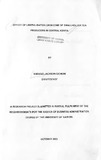| dc.description.abstract | The focus of this study was to assess the effect of liberalisation of the
smallholder tea sector on the income levels of the smallholder farmer in Central
Kenya. To achieve this, smallholder farmers were selected using a multi-stage
cluster sampling. Three districts were selected, out of which six factories were
selected. Namely; Mununga, Kangaita, Ndima, Chinga, Githambo and
Gatunguru. Farmers were randomly selected from the factories. A sample size of
one hundred and forty four (144) farmers was selected. Pertinent data was
obtained for a period covering five years (1998-2002). However most of the
secondary data was available for four years; two years before liberalisation and
two years after liberalisation (1999-2002). Data was collected using
questionnaires. Since data collection was face to face all the respondents
answered the questions. The data was analysed using statistical package for
social sciences (SPSS). Frequency tables, and averages were presented and
statistical tests performed.
The study addressed questions on output of smallholder tea farmers, benefits as
a result of liberalisation, changes in tea prices in the smallholder tea sector and
changes in income of smallholder tea farmers.
The results of the study revealed that, liberalisation of the smallholder tea sector
did not affect tea output by farmers in Central Kenya. Farmers continued to grow
more tea even when tea prices decreased. The results also revealed that the
VIII
cost of production was related to output per factory. One of the major costs that
reduced the income of smallholder tea producers was found to be the factory
processing cost. Kenya tea development agency (KTDA) remained the only
buyer of tea from the farmers and hence no price competition. The same agency
buys and sells farm inputs to the factories for onward distribution to smallholder
farmers.
Although the farmers reported having planted tea over the last five years, this
had not translated into improved yields and hence income. The farmers planted
tea since it was the most suitable source of income in the regions. Thus
liberalisation did not improve the income of the smallholder tea farmers.
Liberalisation meant only changes in management of the tea sector but the
functions remained the same as before liberalisation | en |

